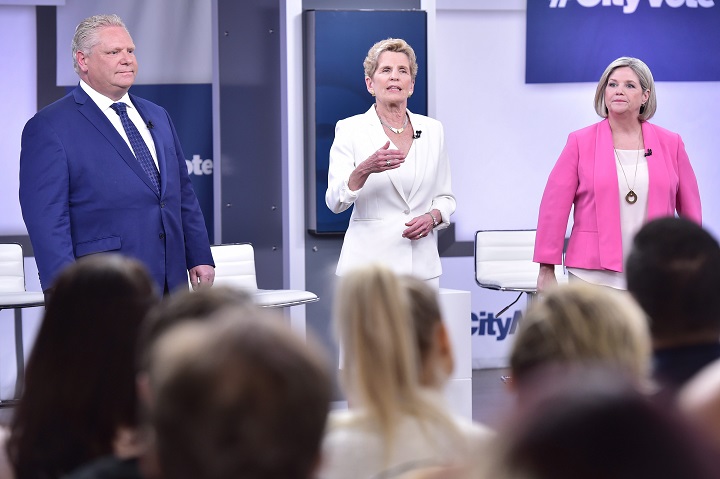One of the characteristics of public opinion is that it tends to move in waves. As with commercial products, once a trend begins, it can continue until something occurs to reverse it or replace it.

From the time of the Ontario Conservative leadership selection in early March through the end of April, public opinion polls seemed frozen with an approximate Conservative lead of 43 per cent to 27 per cent over the Liberals, and the NDP trailing that. Such figures would have translated into a legislature where the Conservatives would have over 80 seats, almost twice the total of the other two parties combined.
WATCH: NDP overtakes Liberals as the ‘Anti-Ford’ party, Ipsos poll says

However, most recent polls conducted since the Ontario election campaign officially began last week suggest there has now been some movement, but not dramatic as yet. The Conservatives and Liberals have both dropped two or three points to the benefit of the NDP. This is sufficient to have the New Democrats vault over the Liberals into second place, assisted by Andrea Horwath’s personal popularity.
The positive image of the NDP leader has not in the past transferred into support for her party, but the Liberal decline has meant that more Ontarians are taking the NDP seriously as an alternative to the Conservatives. When the NDP has taken power in the past, as with Bob Rae in 1990, it has usually resulted from both other parties being viewed negatively. The provincial Liberals have had a good run in governing over the past 15 years, but after four election wins, the consensus seems to be it is time for a change. Whatever mastery of policy detail Kathleen Wynne exhibits, it no longer seems to matter.
- What is a halal mortgage? How interest-free home financing works in Canada
- Ontario doctors offer solutions to help address shortage of family physicians
- Capital gains changes are ‘really fair,’ Freeland says, as doctors cry foul
- Budget 2024 failed to spark ‘political reboot’ for Liberals, polling suggests
There is an adage in politics that “governments are defeated, not elected.” This means that voting typically is more of a referendum on the government of the day than it is of opposition parties. What we appear to be moving toward is an audition of competing opposition parties than it is of the government. Voters increasingly seem to have already made a decision about the Liberals, and it is negative.
From all appearances, this is Doug Ford’s election to lose. At the moment, the Conservative lead is substantial enough to provide a comfortable legislative majority, but it isn’t unassailable. Ford is a much less experienced and savvy politician than Christine Elliot, who would have been a much safer choice to lead the party into a general election campaign.
Ford’s vague command of policy and stiff unspontaneous manner project the image of an artificial, scripted and plodding figure. Indeed, someone who would rather hide in the corner than address the media. The venues and formats of the first two leader debates, suggest that frontrunner Ford hoped nobody would see them. He has already backtracked on his promise to redevelop half the Greenbelt, and fumbled a question on the need for immigrant workers in underdeveloped northern communities.
He has thus far also avoided answering questions as to how he would offset his promise of tax cuts, suggesting only he would find some “efficiencies.” Whether Ford can maintain his party’s current level of support while ducking and weaving around hard policy questions remains to be seen. His opponents, the NDP and Liberals also have some hard questions to address — namely, where the money is coming from to cover the cornucopia of social policy proposals (pharmacare, denticare, and child care, etc), which are popular but uncosted.
As the election’s first official week comes to a close, the Conservatives are clearly in a position to win, but there is now a dynamic at play that suggests a much more exciting campaign than was apparent just a few weeks ago.
Barry Kay, an associate professor in the Department of Political Science at Wilfrid Laurier University and contributes seat projections to the Laurier Institute for the Study of Public Opinion (LISPOP). As a contributor to LISPOP, Kay helped generate the seat projectios mentioned in this column.



Comments